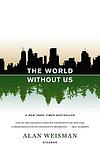The Greatest "Speculative Fiction, Life Sciences" Books of All Time
Click to learn how this list is calculated.
This list represents a comprehensive and trusted collection of the greatest books. Developed through a specialized algorithm, it brings together 300 'best of' book lists to form a definitive guide to the world's most acclaimed books. For those interested in how these books are chosen, additional details can be found on the rankings page.
Genres
Speculative fiction is an umbrella genre encompassing narrative fiction with supernatural or futuristic elements. This includes genres such as science fiction, fantasy, horror, supernatural fiction, superhero fiction, utopian and dystopian fiction, apocalyptic and post-apocalyptic fiction, and alternate history. The unifying factor of speculative fiction is its departure from the narrative constraints of reality, exploring imaginative and often profound questions that challenge our understanding of the world and our place within it. These stories often delve into themes like the human condition, social commentary, and the exploration of philosophical and ethical dilemmas through the lens of the fantastical or the yet-to-be-possible. By pushing the boundaries of the known, speculative fiction invites readers to consider the myriad possibilities of existence and the potential consequences of our actions in worlds that are, at once, vastly different from and eerily similar to our own.
The "Life Sciences" category in books encompasses a broad range of disciplines that study living organisms and life processes. This includes fields such as biology, botany, zoology, microbiology, genetics, biochemistry, and ecology, among others. Books in this category may delve into the intricate mechanisms of the cell, the complex interactions within ecosystems, the genetic blueprints that dictate the traits of organisms, or the evolutionary processes that have shaped life on Earth. They can range from introductory texts for students to advanced research publications for specialists. The Life Sciences category is essential for anyone seeking to understand the natural world, from the molecular level to the biosphere, and it serves as a vital resource for students, researchers, and professionals in health, agriculture, conservation, and biotechnology.
Countries
Date Range
Reading Statistics
Click the button below to see how many of these books you've read!
Download
If you're interested in downloading this list as a CSV file for use in a spreadsheet application, you can easily do so by clicking the button below. Please note that to ensure a manageable file size and faster download, the CSV will include details for only the first 500 books.
Download-
1. Jurassic Park by Michael Crichton
A billionaire entrepreneur, with the help of genetic scientists, creates a wildlife park on a secluded island filled with genetically engineered dinosaurs. When a small group of experts are invited to the park for a preview, things go awry as the security systems fail and the dinosaurs break free. The group must survive and escape the island while dealing with the dangerous prehistoric creatures and the moral implications of tampering with nature.
-
2. Darwin's Radio by Greg Bear
In the science fiction novel, a groundbreaking discovery of ancient human remains leads to the uncovering of a new, heretofore unseen stage of human evolution. Scientists grapple with the implications of a dormant virus that has suddenly awakened within human DNA, causing rapid, radical, and uncontrolled genetic mutations. As the virus spreads, society is thrown into chaos, with fear and uncertainty about the future of humanity. The protagonists, a molecular biologist and a paleontologist, race against time to understand the virus, known as "Darwin's Radio," and its potential to either doom or elevate the human race. Their journey is fraught with personal and professional challenges as they confront the possibility that evolution might be a much more active and immediate force than anyone had ever imagined.
-
3. The World Without Us by Alan Weisman
This book is a thought-provoking exploration of what would happen to the natural and artificial world if humans suddenly disappeared. It delves into how our massive infrastructure would decay and how, over time, the Earth would heal from human impact, erasing all traces of our civilization. The author uses this premise to illustrate the lasting impact of humanity on the planet, providing a unique perspective on issues like climate change, pollution, and deforestation.
Reading Statistics
Click the button below to see how many of these books you've read!
Download
If you're interested in downloading this list as a CSV file for use in a spreadsheet application, you can easily do so by clicking the button below. Please note that to ensure a manageable file size and faster download, the CSV will include details for only the first 500 books.
Download

